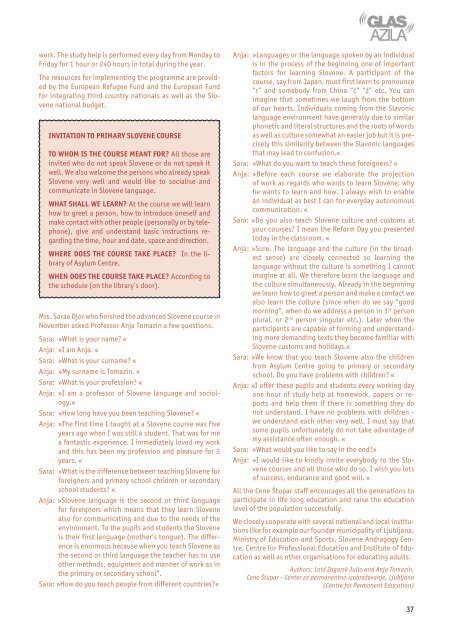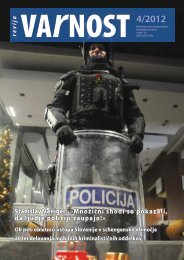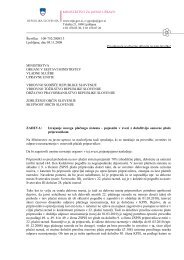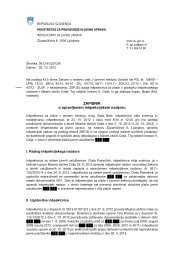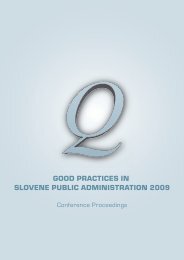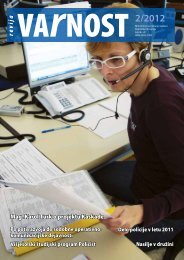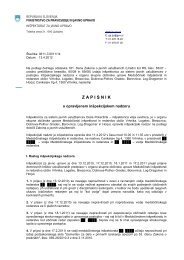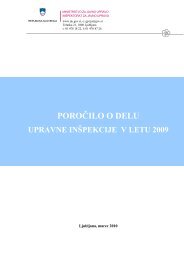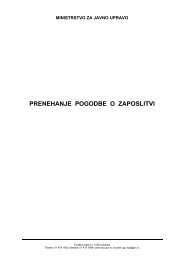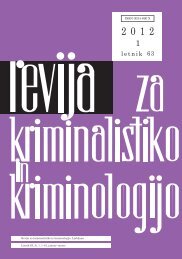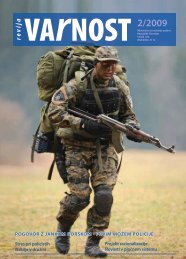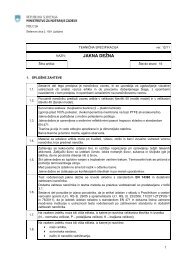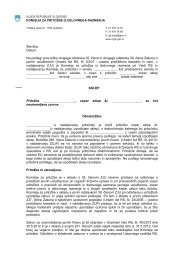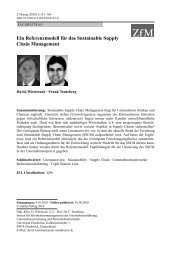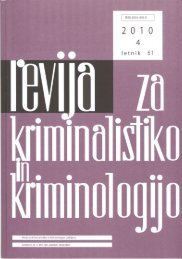glasilo st. 2.indd - Ministrstvo za notranje zadeve
glasilo st. 2.indd - Ministrstvo za notranje zadeve
glasilo st. 2.indd - Ministrstvo za notranje zadeve
Create successful ePaper yourself
Turn your PDF publications into a flip-book with our unique Google optimized e-Paper software.
work. The <strong>st</strong>udy help is performed every day from Monday to<br />
Friday for 1 hour or 240 hours in total during the year.<br />
The resources for implementing the programme are provided<br />
by the European Refugee Fund and the European Fund<br />
for integrating third country nationals as well as the Slovene<br />
national budget.<br />
INVITATION TO PRIMARY SLOVENE COURSE<br />
TO WHOM IS THE COURSE MEANT FOR? All those are<br />
invited who do not speak Slovene or do not speak it<br />
well. We also welcome the persons who already speak<br />
Slovene very well and would like to socialise and<br />
communicate in Slovene language.<br />
WHAT SHALL WE LEARN? At the course we will learn<br />
how to greet a person, how to introduce oneself and<br />
make contact with other people (personally or by telephone),<br />
give and under<strong>st</strong>and basic in<strong>st</strong>ructions regarding<br />
the time, hour and date, space and direction.<br />
WHERE DOES THE COURSE TAKE PLACE? In the library<br />
of Asylum Centre.<br />
WHEN DOES THE COURSE TAKE PLACE? According to<br />
the schedule (on the library’s door).<br />
Mrs. Saraa Djor who finished the advanced Slovene course in<br />
November asked Professor Anja Tomazin a few que<strong>st</strong>ions.<br />
Sara: »What is your name? «<br />
Anja: »I am Anja. «<br />
Sara: »What is your surname? «<br />
Anja: »My surname is Tomazin. «<br />
Sara: »What is your profession? «<br />
Anja: »I am a professor of Slovene language and sociology.«<br />
Sara: »How long have you been teaching Slovene? «<br />
Anja: »The fir<strong>st</strong> time I taught at a Slovene course was five<br />
years ago when I was <strong>st</strong>ill a <strong>st</strong>udent. That was for me<br />
a fanta<strong>st</strong>ic experience. I immediately loved my work<br />
and this has been my profession and pleasure for 3<br />
years. «<br />
Sara: »What is the difference between teaching Slovene for<br />
foreigners and primary school children or secondary<br />
school <strong>st</strong>udents? «<br />
Anja: »Slovene language is the second or third language<br />
for foreigners which means that they learn Slovene<br />
also for communicating and due to the needs of the<br />
environment. To the pupils and <strong>st</strong>udents the Slovene<br />
is their fir<strong>st</strong> language (mother’s tongue). The difference<br />
is enormous because when you teach Slovene as<br />
the second or third language the teacher has to use<br />
other methods, equipment and manner of work as in<br />
the primary or secondary school”.<br />
Sara: »How do you teach people from different countries?«<br />
Anja: »Languages or the language spoken by an individual<br />
is in the process of the beginning one of important<br />
factors for learning Slovene. A participant of the<br />
course, say from Japan, mu<strong>st</strong> fir<strong>st</strong> learn to pronounce<br />
“r” and somebody from China “č” “ž” etc. You can<br />
imagine that sometimes we laugh from the bottom<br />
of our hearts. Individuals coming from the Slavonic<br />
language environment have generally due to similar<br />
phonetic and literal <strong>st</strong>ructures and the roots of words<br />
as well as culture somewhat an easier job but it is precisely<br />
this similarity between the Slavonic languages<br />
that may lead to confusion.«<br />
Sara: »What do you want to teach these foreigners? «<br />
Anja: »Before each course we elaborate the projection<br />
of work as regards who wants to learn Slovene, why<br />
he wants to learn and how. I always wish to enable<br />
an individual as be<strong>st</strong> I can for everyday autonomous<br />
communication. «<br />
Sara: »Do you also teach Slovene culture and cu<strong>st</strong>oms at<br />
your courses? I mean the Reform Day you presented<br />
today in the classroom. «<br />
Anja: »Sure. The language and the culture (in the broade<strong>st</strong><br />
sense) are closely connected so learning the<br />
language without the culture is something I cannot<br />
imagine at all. We therefore learn the language and<br />
the culture simultaneously. Already in the beginning<br />
we learn how to greet a person and make a contact we<br />
also learn the culture (since when do we say “good<br />
morning”, when do we address a person in 3 rd person<br />
plural, or 2 nd person singular etc.). Later when the<br />
participants are capable of forming and under<strong>st</strong>anding<br />
more demanding texts they become familiar with<br />
Slovene cu<strong>st</strong>oms and holidays.«<br />
Sara: »We know that you teach Slovene also the children<br />
from Asylum Centre going to primary or secondary<br />
school. Do you have problems with children? «<br />
Anja: »I offer these pupils and <strong>st</strong>udents every working day<br />
one hour of <strong>st</strong>udy help at homework, papers or reports<br />
and help them if there is something they do<br />
not under<strong>st</strong>and. I have no problems with children -<br />
we under<strong>st</strong>and each other very well. I mu<strong>st</strong> say that<br />
some pupils unfortunately do not take advantage of<br />
my assi<strong>st</strong>ance often enough. «<br />
Sara: »What would you like to say in the end?«<br />
Anja: »I would like to kindly invite everybody to the Slovene<br />
courses and all those who do so, I wish you lots<br />
of success, endurance and good will. «<br />
All the Cene Štupar <strong>st</strong>aff encourages all the generations to<br />
participate in life long education and raise the education<br />
level of the population successfully.<br />
We closely cooperate with several national and local in<strong>st</strong>itutions<br />
like for example our founder municipality of Ljubljana,<br />
Mini<strong>st</strong>ry of Education and Sports, Slovene Andragogy Centre,<br />
Centre for Professional Education and In<strong>st</strong>itute of Education<br />
as well as other organisations for educating adults.<br />
Authors: Laid Zagorsk Julio and Anja Tomazin,<br />
Cene Štupar – Center <strong>za</strong> permanentno izobraževanje, Ljubljana<br />
(Centre for Permanent Education)<br />
37


